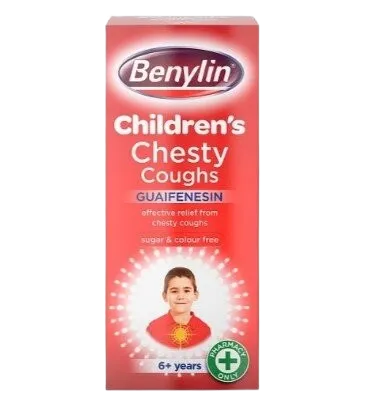
Images are for illustration purposes only.
Benylin Children's Chesty Cough
Available size:
Price £3.99
Expected Delivery: Tuesday, 30 December 2025
Why choose Click Pharmacy?
- Rated 'Excellent' on Trustpilot
- UK Registered Pharmacy
- Price Match Guarantee
GPhC Internet Pharmacy Registration
UK Pharmacy Registration Number 9011460
Benylin Children's Chesty Coughs syrup contains guaifenesin which is a cough expectorant used for the relief of symptoms of acute productive (chesty) cough. Guaifenesin works by loosening the mucus in the lungs and the airways to make it easier for the child to cough it up. It does this by increasing the volume of fluid produced in the airways. It also effectively aids in relaxing the throat and chest so that coughing is less strenuous on the body.
Patient Information Leaflet
Always read the patient information leaflet before starting your treatment. The patient information can be found here.
For children between 6 and 12 years old the dose is two 5ml spoonful (10ml total). This is to be taken four times a day, up to a maximum of 4 doses in 24 hours. Benylin Children's Chesty Coughs syrup is for oral use only.
You should only give this medicine as required, following the dosage instructions carefully. If you forget to give or take a dose, the next dose should be taken when needed. You should not give a double dose.
This medicine is not recommended for children under 6 years of age.
Get advice from your pharmacist before using Benylin Children's Chesty Coughs in combination with other cold and flu or cough preparations. Different products may contain the same active ingredient, which may lead to an excessive intake in dose. For further advice, talk to your pharmacist.
Although it is rare for children to experience side effects after taking Benylin Children’s Chesty Cough Syrup, some may experience:
- Diarrhoea
- Vomiting
- sickness
If your child experiences rash, redness, itching or swelling of skin they may be experiencing an allergic reaction to the cough syrup. If this happens you should stop giving your child Benylin Children’s Chesty Cough Syrup immediately and seek medical advice from a doctor or pharmacist.
Do not use this medicine:
- There is a history of allergy to this product or any of the ingredients.
- If the child is taking any other cough and cold medicine.
- If the child is under 6 years of age.
If any of these apply, get advice from a doctor or pharmacist without using Benylin Children's Chesty Coughs.
Can I give my child other medication while they are taking Benylin Children’s Chesty Cough Syrup?
It is safe to combine other medications with Benylin Children's Chesty Cough Syrup, however you should always consult with a GP or pharmacist before combining different sets of medication.
Benylin Children's Chesty Cough Reviews
Expected Delivery: Tuesday, 30 December 2025